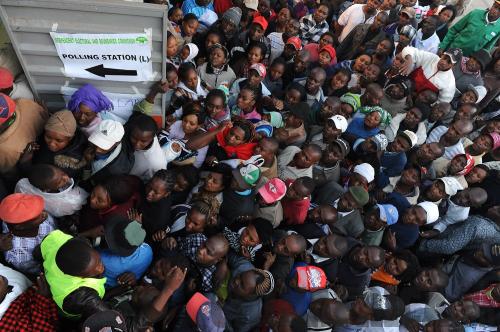|
|

|
|
Kenyans flock to the polls during the March elections won by Uhuru Kenyatta (XINHUA/AFP) |
With ethnic tensions boiling under the surface, and political power tied to ethnic communities, general elections in Kenya, such as the one held on March 4 this year, always have the potential to spark conflict.
However, Kenyans went to the polls and made their choice, voting in Uhuru Kenyatta as president and William Ruto as his vice president in a peaceful, albeit disputed, process. Adding an element of controversy to the election outcome is the fact that both officials are wanted by the International Criminal Court (ICC) for crimes against humanity following their involvement in the post-election violence that erupted five years ago.
The two campaigned on a joint ticket, forming so-called a "Jubilee Alliance." They called for unity and reconciliation among their two communities – the Kikuyu, Kenya's largest ethnic group, and the Kalenjin. And they won, prompting Kenyatta to say, "Finally Kenya has come of age."
Chinese support
China was the first global superpower to congratulate Kenyatta on winning the mandate of the Kenyan people. The world's other superpower, America, did not mention Kenya's new president by name, but still, like China, praised the people of Kenya for holding peaceful elections.
"China and Kenya have a deep tradition of friendship. China attaches great importance to its relations with Kenya and regards Kenya as an important cooperative partner in Africa," said Hua Chunying, a spokesperson for China's Ministry of Foreign Affairs, in an email dispatch sent to ChinAfrica via China's Embassy in Nairobi.
"We would like to strengthen cooperation with the new government of Kenya and bring friendly bilateral relations to a higher level to further benefit the people of both countries," she said.
That's a sign that the multibillion-dollar investments made by Chinese construction companies in Kenya, in addition to the numerous loans that the Kenyan Government has been granted by China for infrastructure construction, are likely to continue under the new administration.
Big victory
Many other countries, including India, Rwanda and South Africa, also offered their good wishes. The EU was careful to congratulate the Kenyan people, avoiding any mention of Kenyatta.
Despite a court case challenging the election results, there was no doubt that the Uhuru and Ruto alliance, or UhuRuto as they are popularly known in Kenya, would be victorious on election day.
They won the presidency with 6,173,433 votes, giving them a margin of victory of over 830,000 votes more than their closest challenger, the outgoing Prime Minister Raila Odinga. Though Odinga insists that the election was not fair, observers have declared it to be valid.
Kenyatta's win is historic. His father was the country's first president after Kenya gained independence 50 years ago. Now, the nation's first president's son has become the first president to be elected after the passage of Kenya's new constitution, which is just 30 months old. Kenyatta will also be the leader under which the country will celebrate its Golden Jubilee on June 1 this year.
Kenyatta and Ruto survived several court cases challenging their eligibility due to their indictment for committing crimes against humanity. They won these legal battles by arguing that the country's constitution maintained that people are innocent until proven guilty, and the ICC charges against them had yet to be proven.
More than 85 percent of the country's 14.3 million eligible voters turned up to cast their ballots. Half of the voters voted for Kenyatta, allowing him to meet the constitutional threshold required to rule the country.
Kenyatta still faces two major challenges. First, he must win over the 6.1 million Kenyans who did not vote for him in the elections. Second, he must address questions about how his case before the ICC will be resolved without sacrificing justice.
|